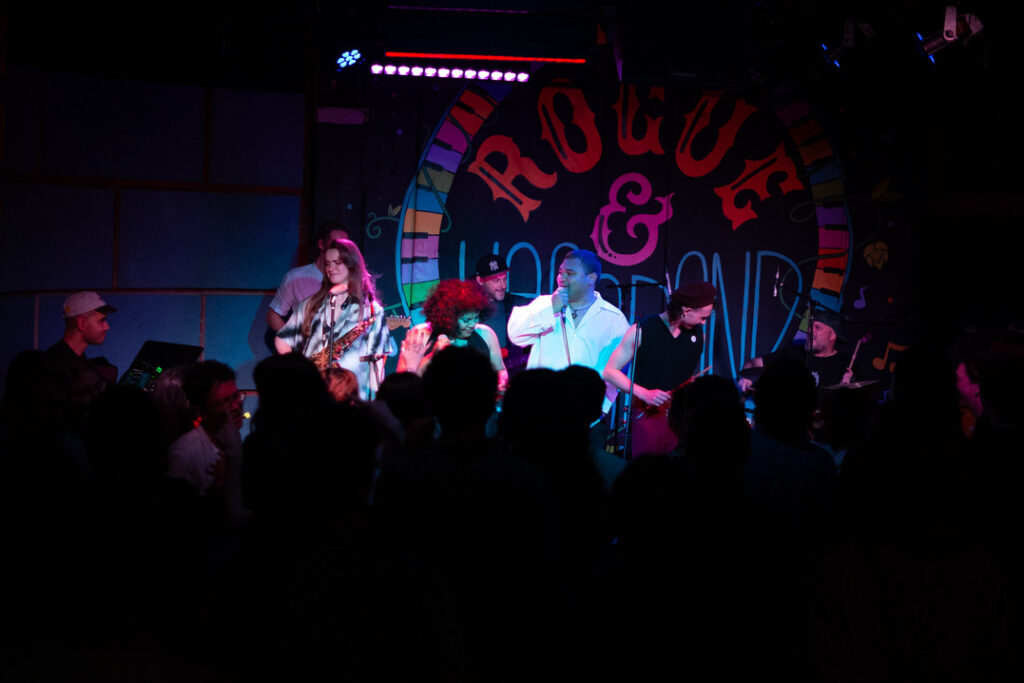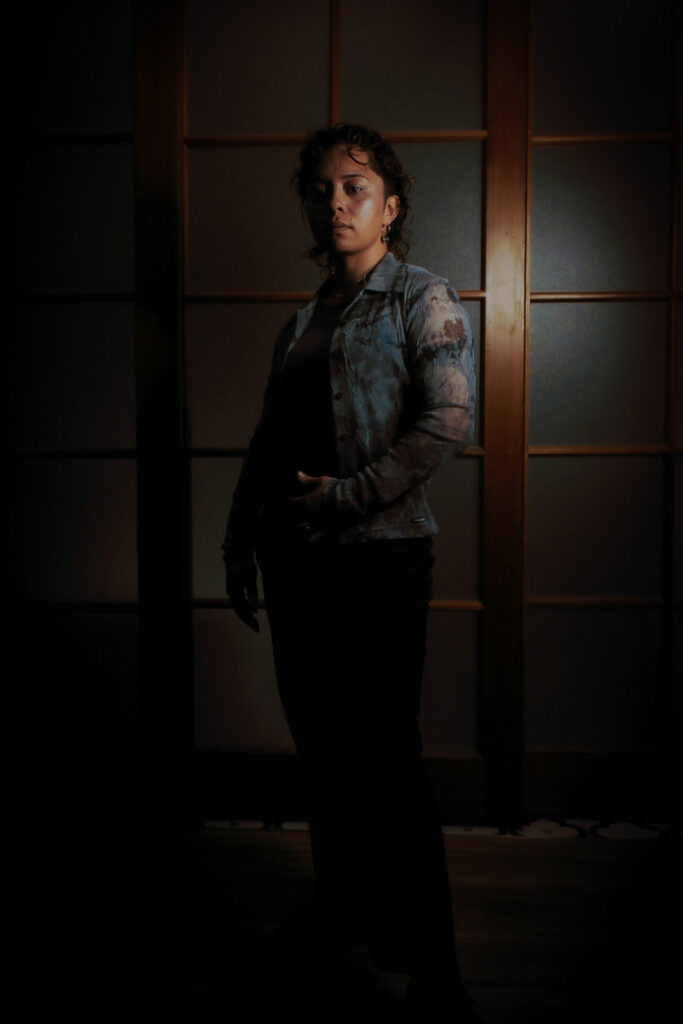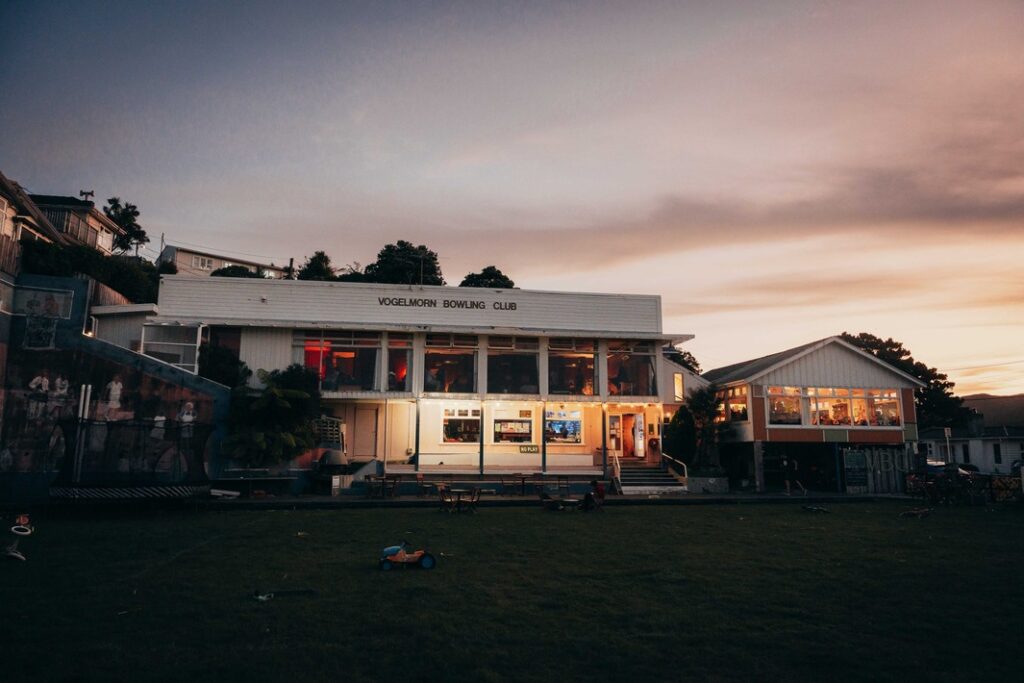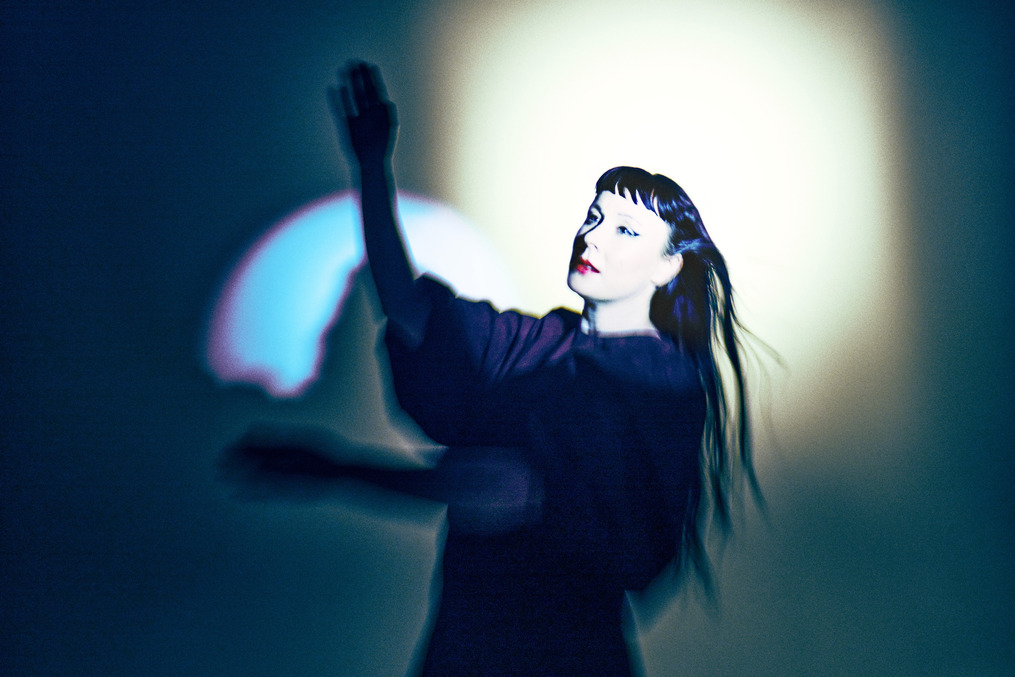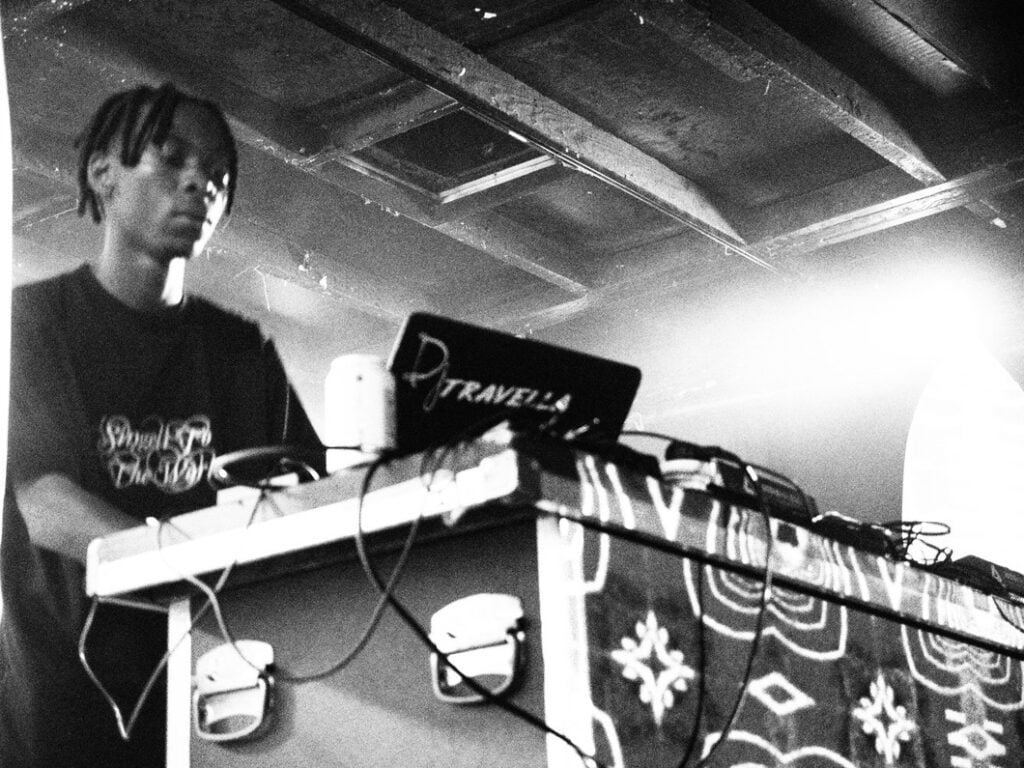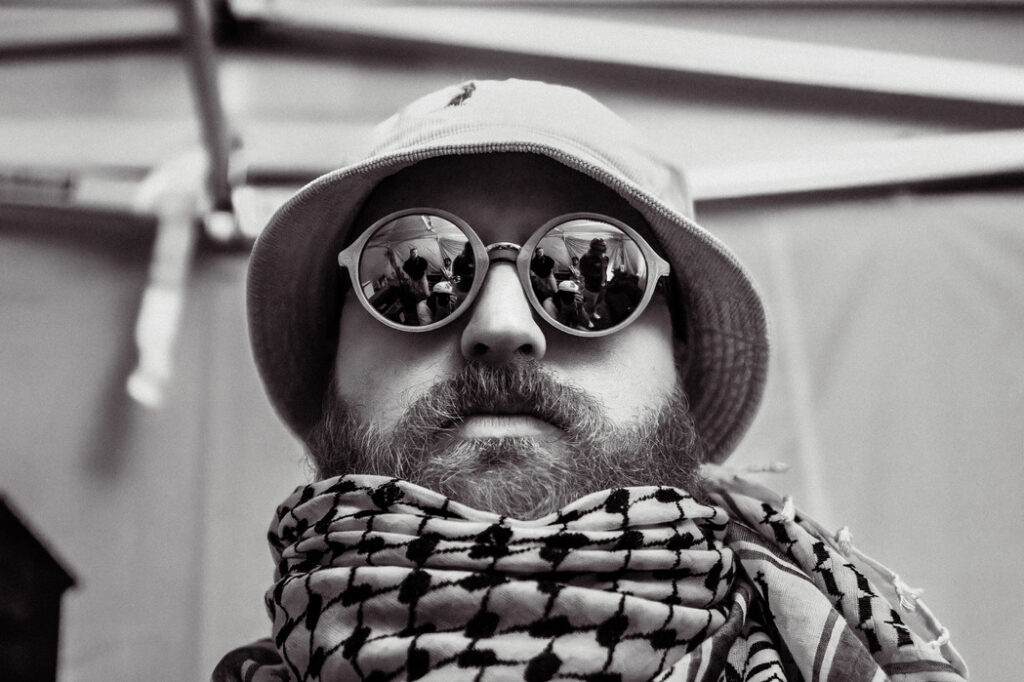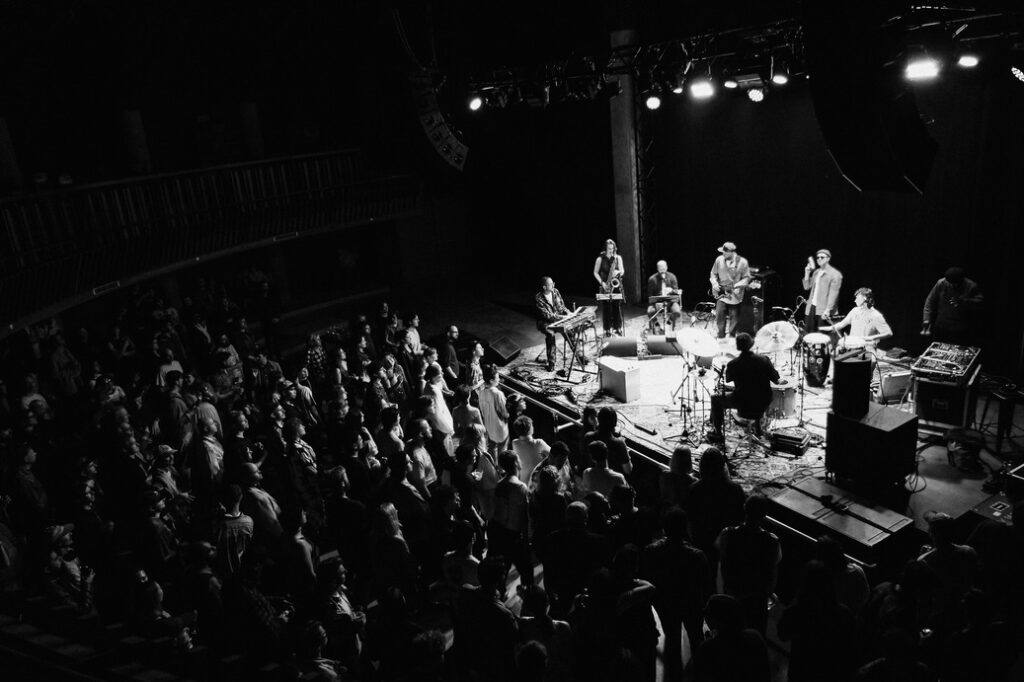Maeve O'Connell
Vibe Check: Taking the Pulse of the Wellington Music Scene in 2024
Twenty years after it enjoyed a breakout moment, Wellington is facing economic and infrastructural challenges that underscore how much the city has changed over the last two decades
Twenty years ago, Wellington music was at the height of a breakthrough moment. Buoyed by grassroots support, a community of jazz and rock-influenced roots, reggae, soul, and hip-hop musicians made their way from the capital’s dive bars and cocktail lounges onto the biggest festival stages in the country.
Mostly D.I.Y. operators who worked with or ran their own small labels, acts like Fat Freddy’s Drop, Trinity Roots, The Black Seeds, Deva Mahal, Kora, Hollie Smith, and Rhombus (loosely described as “The Wellington Sound”) emerged as part of a generation of fun-loving hospitality business owners, jack-of-all-trades film and television workers, comedians, DJs, writers, and artists. They benefited from affordable rent prices, inner city warehouse spaces, bars and venues with licenses that ran to 6am (or later), the Fifth Labour Government’s artist benefit scheme PACE, and an electric sense of possibility that crackled through the streets.
Before streaming services, student radio stations like Wellington’s Radio Active 88.6 FM held a more overarching influence within the local counterculture. Hitting the station’s playlist often led to opportunities to perform for sizable audiences at local free-entry summer outdoor concerts like Whopper Chopper or One Love. From there, acts made their way onto the national touring and festival circuits. These were the last days of the CD era. If you found the right pocket, gold, platinum, and multi-platinum album sales followed. The summer days were long and warm, and the parties went all night.
In tandem, the capital’s hip-hop, house, techno, and drum & bass scenes rocketed along in the early 2000s. By 2006, the landscape began splintering as successive waves of indie, dance-punk, metal, alt-rock, electroclash, folk, neo-soul, and electronica acts captured giggoers’ imaginations. The Phoenix Foundation, So So Modern, Connan & the Mockasins, Over the Atlantic, Disasteradio, Beastwars, Electric Wire Hustle, Estère, Lord Echo, Mermaidens, Earth Tongue, Orchestra of Spheres – the list goes on. Meanwhile, smaller movements built momentum as social media-led fragmentation set in, and commercially aspirational outliers like Flight of The Conchords, Ladyhawke, and Drax Project successfully emerged on the international stage.
Today, Wellington music feels less like a unified community and more like a multiverse of collectives and sub-scenes that either regularly cross paths or slip past each other unbeknownst, like ships in the night. Regardless, they’re all contending with the same economic and infrastructural challenges that underscore how much the city has changed over the last two decades. It’s a tough context to be operating in, but as Rolling Stone AU/NZ discovered over a series of conversations, there’s still plenty to be excited about.
On a Friday evening in November, a crowd of students, young professionals and older music lovers gathered at The Rogue & Vagabond, a craft beer bar that faces Glover Park in the inner city Te Aro quarter. In recent years, it’s become an important, low-stakes live music performance space.
On stage, the APRA award-winning saxophonist, flautist and composer Louisa Williamson held court over ‘Heavy Flow’, a monthly jam night she hosts with a rotating array of jazz and jazz-adjacent musicians, vocalists and rappers from around the capital, many of whom – including the vocalist Iris Little and the pianist/keyboardist Leonardo Coghini – shined on stage recently at St. James Theatre, during the 2024 APRA Silver Scroll Awards.
Love Music?
Get your daily dose of everything happening in Australian/New Zealand music and globally.
Halfway through the evening, Williamson and the band were joined by the idiosyncratic Māori hip-hop artist MĀ. For a few golden minutes, Louisa and MĀ traded saxophone lines and melody-tinged rhymes over a funky breakbeat. Later, the young Samoan tenor LJ Crichton belted it out, twisting his operatic prowess into show-stopping uptempo R&B.
Several days later, I met Williamson at Alswaida, a Syrian street food shop outside Willis Street’s Press Hall. Over lunch, she expressed measured enthusiasm about pursuing music in Wellington. “I’ve been fortunate to find like-minded people here who still see a lot of opportunity,” she said, but she didn’t shy away from discussing the challenges. “There could be a lot more of everything,” she continued. “In my circles, if The Rogue [& Vagabond] were to close, there would be nothing. Bars willing to accommodate and support live music are so important.”
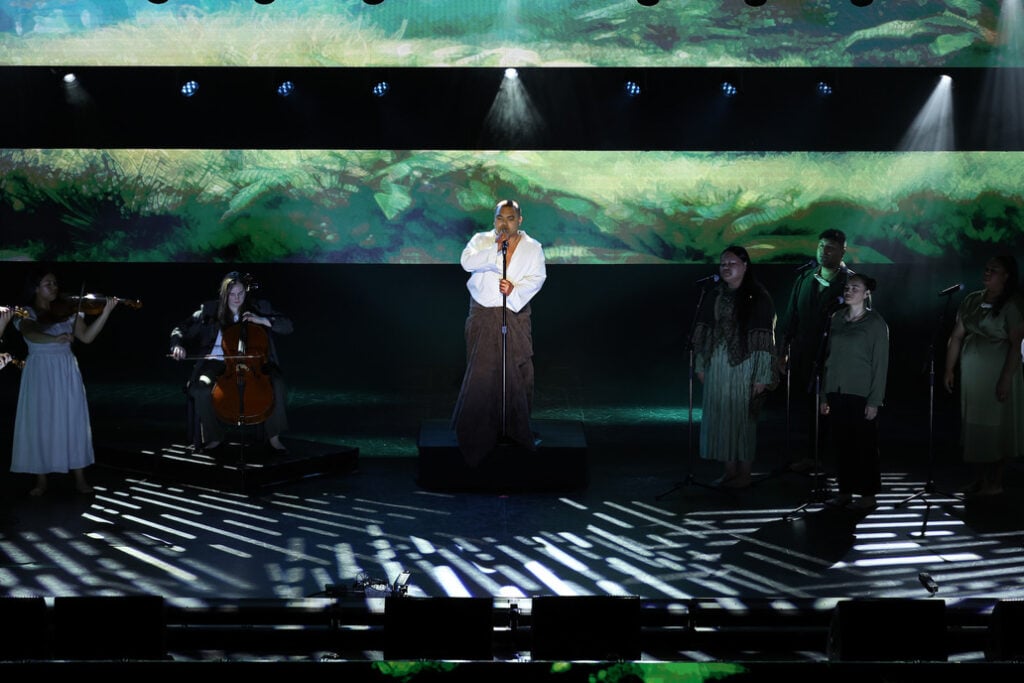
Image: LJ Crichton and ensemble performing at the 2024 APRA Silver Scroll Awards Credit: Stijl Photography
A Masters-level New Zealand School of Music graduate, Williamson is a university music teacher, a highly versatile session musician, and a skilled bandleader/composer. This year, she was commissioned to compose a new work about literal and figurative division called The Chasm Where We Fall Into Each Other for the Wellington Jazz Festival. Lately, she’s been working closely with MĀ, Crichton, and the Māori soul artist AJA, who just released her new album, KĀWAI. “It’s exciting to be able to support people I have a lot of faith in as they develop their musical identities,” she enthused.
MĀ taught herself how to make beats and record during the COVID-19 pandemic lockdowns in 2020. The following year, she released her self-produced debut, Breakfast With Hades, through Meeting House Records, an artist collective she runs with AJA and the respected Māori psychedelic soul artist Mara TK. (Mara TK helped to produce AJA’s debut album.) Since then, MĀ and her band, The Fly Hunnies, have become hometown favourites. Outside the capital, she’s hit the road with Reon Bell, aka DJ Wynona, opening up for Avantdale Bowling Club, Ice Cube, and Souls of Mischief.
“My issue isn’t just to do with music in Wellington… It’s culture. We have an incredible community, but there’s no heartbeat in the city’s centre.”
Echoing some of Williamson’s sentiments, MĀ is excited by the talent here. Beyond her immediate musical community, she praises the self-described “mum rock” group Sure Boy and 2024 Taite Music Prize winner Vera Ellen, who recently toured Australia opening for Crowded House.
“I reckon Wellys would thrive so much if there was more collaboration between genres,” she said. “When we’re doing gigs and picking support acts, we should let our fans hear an act from a different scene. Let’s get these relationships started.” (MĀ’s comments remind me of a concert I attended at Meow, a longstanding staple of live music in the inner city. On the night, the Japanese-American alt-rock artist Rachel Andie had Louisa Williamson’s jazz quartet open, stunning the indie crowd into a pin-drop silence.)
Pragmatically, MĀ balanced her enthusiasm with valid concerns. In 2004, the potential pathways towards building an audience felt clearly laid out. Twenty years on, it’s a lot harder to get your head around how to really push yourself forward or cut through the algorithmic noise of social media. “There are a lot of people present in the Wellys music scene right now,” she observed. “That’s cool, but it’s hard to see what’s really going to happen with them in a couple of years. I see a lot of people who sound mean, but I don’t know if they’re ever really going to leave that bar or space.”
For MĀ, the next step is open conversations between independent artists. “We need to figure out how everyone is doing everything,” she said. “No one really talks about the things they do to get their music out there. How they pay their taxes. The fact you need to pay taxes, etc. We can’t have these conversations with business people because artists aren’t trying to hear that language. It only really works if they’re still independent. There’s no point talking to a signed artist because someone else is taking care of things for them.”
Outside of music-friendly bars and venues like The Rogue & Vagabond, Meow, Valhalla, Moon, B.Space, and Live Nation’s San Fran venue on Cuba Street – home to the longstanding weekly free entry band night, Eyegum Wednesdays – emerging Wellington musicians increasingly rely on community centres, artist-run practice/performance spaces and house parties to get their start. Two crucial hubs are Vogelmorn, a suburban community centre housed inside a former bowling club and Pyramid Club, an experimental/D.I.Y. music space in a former industrial warehouse on the edges of the inner city.
In late September, I stood in a crowd outside the Pyramid Club at sunset. We were waiting for two young siren crews from Porirua and the Hutt Valley, SwitchHittaz Juicy Famili and SwitchHittaz Tea, to demonstrate the modified loudspeakers attached to their cars and bicycles. Before they started, I chatted with Missus, an emerging DJ who plays ghettotech and baile funk-leaning dance sets, and Wear Pounamu, a low-profile ambient club music beatmaker who has found an audience on Soundcloud. Both exist within a scene of warehouse raves, outdoor parties and impromptu gigs that would fly under the radar of many live music fans in Wellington.
A few weeks later, I hopped on a video call with Ebony Lamb, a respected Wellington singer-songwriter who made her name in the alt-country band Eb & Sparrow. Since releasing her self-titled debut solo album through Nadia Reid’s Slow Time Records in 2023, Lamb has played in some of the capital’s most extravagant performance rooms – The Opera House and The Michael Fowler Centre – opening for Calexico and Jimmy Barnes. More often than not, though, you’ll still find her in community spaces such as Vogelmorn.
Lamb is closely attuned to the challenges facing musicians in Wellington, but she locates them within a bigger context. “My issue isn’t just to do with music in Wellington,” she said. “It’s culture. We have an incredible community, but there’s no heartbeat in the city’s centre. We don’t even have a central public library or a functional civic square. There’s nowhere to hang out, get a coffee, and have a creative conversation.”
Among other factors, such as noise control issues and successive city councils neglecting infrastructure – a situation catalysed by the ongoing impact of the 2016 Kaikōura earthquake on the city’s buildings – Lamb points some blame towards the economics of commercial rent prices in the central city, which she described as “having been left to go toxic.”
It’s another example of inner-city gentrification, whereby the smaller local businesses that made things exciting – in this scenario, now-shuttered bars, venues, and nightclubs that accommodated live music and DJs, such as Sandwiches, Mighty Mighty, The Matterhorn, Bar Bodega, The Third Eye, and Hashigo Zake – were pushed out, making room for multinational chains, real estate agencies, finance companies, and the like.
“Wellington is an accessible city, and their amount of talent per capita is crazily outsized.”
When it comes to the venue owners and musicians fighting the good fight, Lamb insists “there are some absolute heroes here,” noting two forces, in particular, she sees as really having their day in Wellington right now: jazz music and female bandleaders. Lamb’s bassist, Phoebe Johnson, the leader of the eight-piece Wellington jazz-funk band Revulva, turns this Venn diagram into a single circle. Earlier this year, Revulva self-released their debut album before hitting the road to play to packed audiences nationwide.
Despite the decrease in music spaces in the inner city, on an average week, you’ll still find bands or DJs playing in 10 to 12 different venues, bars, and multi-purpose facilities, many within walking distance of each other, as documented on an Instagram gig guide called @theimage04.
“Wellington is an accessible city, and their amount of talent per capita is crazily outsized,” said Lamb’s drummer, Hikurangi Schaverien-Kaa. A software engineer by day and musician by night, Schaverien-Kaa also drums with an array of indie rock, folk, hip-hop, and jazz acts, including Dateline, Sureboy, French for Rabbits, and MĀ & The Fly Hunnies. “From a creative perspective, it’s super promising and fun,” he continued, pausing before he let the other shoe drop. “As a career, it’s completely unsustainable. The cost of living here is comparable to London or New York.”
In terms of an overview of music in Wellington, one of the easiest ways to look at things is to divide it into live music and DJ culture. While many of the city’s DJ scenes note similar issues to the musicians, they’re more optimistic about the landscape. Broadly speaking, this comes down to cultural trends and economic realities.
Ten years ago, hip-hop sat at the heart of popular culture in New Zealand, but these days, dance music has drifted closer to the centre. In a testament to this, earlier in the year, DJ culture in the capital found a breakout star in Tessa Hills, aka DJ Messie. After winning a competition to support the English superstar producer Fred again.., she went on a national tour before travelling to the UK to perform at Glastonbury.
“The electronic music space is quite healthy in Wellington at the moment,” said Nick Medder, the current Station Manager of Radio Active 88.6 FM. He also thinks it’s been easier for DJ scenes to navigate the cost of living crisis. “It’s a tough economic climate,” Medder continued. “Booking five DJs is just cheaper than booking five bands. You can use the same gear and don’t need a backline.”
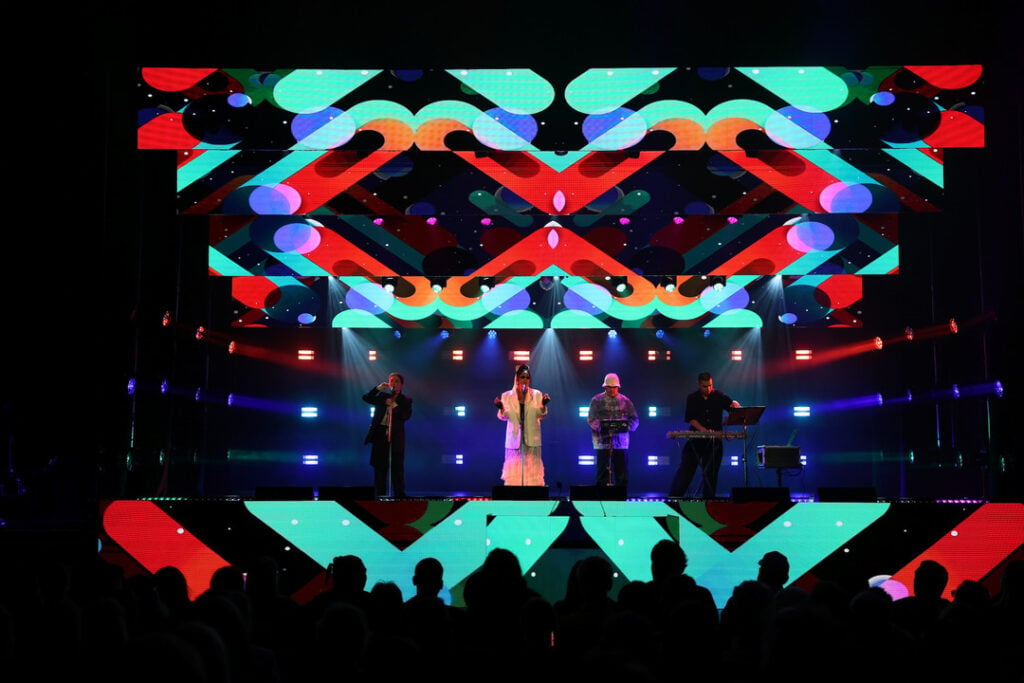
Image: Iris Little, AJA, Riki Gooch, and Leonardo Coghini performing at the 2024 APRA Silver Scroll Awards Credit: Stijl Photography
Another recurring topic in discussions about the realities of not just music, but the arts in general in the capital is the need for accessible funding. I lean towards thinking that what arts practitioners really need are the same things everyone needs: affordable rent, utility and shopping bills, space to think, relax, and reflect, discretionary spending money for entertainment, and the ability to save. If you fix these issues and address how challenging it has become for music venue operators to deal with licensing and noise control issues as high-density residential development increases in the city, the artists will figure out the rest.
However, until we see stronger political leadership around these issues, the context is the context. “There’s no silver bullet, I think, apart from mass infrastructural changes,” said the art-rock musician Elliot Dawson. “I’d love to live in a world where it was easy to make weird shit and have people care about it.”
Having spent eight years as a Wellingtonian, Dawson has already lived through three waves of rock music in the capital. “When I first moved down, it was peak Mac DeMarco-influenced surf rock,” he says. “The second wave was the post-lockdown boom when bands were in an alt-rock, post-rock phase. Now, we’re in an era where there is less of an identifiable scene sound. The defining quality seems to be a feeling of siloing. I think it comes from people being in their own worlds on the internet.” In April 2025, Dawson will self-release his second album, Certain Death.
Two DJ collectives currently figuring it out in Wellington are Froth Entertainment and Ghost Media. In late October, I attended a party co-promoted by Froth Entertainment and the New Zealand fashion house and esoterica store Hi-Fi Sci-Fi at the San Fran venue. Listening to the Tanzanian cyber-singeli DJ Travella tear up the dancefloor with a turbocharged set felt like a genuine transmission from the future. Bookending things, several Māori and Pasifika IDM, ambient and club DJs, including Wear Pounamu and Auckland’s Half Queen, opened and closed the night with great panache.
“If you’re not making money, the whole thing falls apart… But making money is never our motivation. That’s what makes it all so beautiful.”
For Theodoor Kraayvanger, aka DJ Kraayjoy, who founded Froth Entertainment in 2019, throwing dance parties is about presenting local and international talent to audiences from all walks of life. “I try to stay open-minded about the styles and genres of experiences I like to provide,” he explained while sending me a series of voice notes from Melbourne, where he’s been busy scoping things out.
Despite current economic challenges, Froth maintains a regular presence in the city through well-attended and produced events held at the B.Space basement nightclub on Cambridge Terrace, Meow, Valhalla, and a multi-level space on Courtenay Place called The Grand. Although Kraayvanger finds local bar licensing times frustrating (“it does make it tricky to keep the nightlife alive if you keep letting us have less night time to party”), he remains optimistic.
A few days after the DJ Travella show, I met up with UK-born rapper, DJ and producer Casper de Wit, aka Young Gho$t, at Midnight Espresso, the longest-running late-night coffee shop in the city. De Wit runs Ghost Media, a boutique promotions group that specialises in throwing garage, dubstep and jungle/drum & bass parties, often held at Valhalla on Vivian Street or Moon in Newtown.
Ostensibly founded to accommodate the local metal, punk, and alternative rock scenes, Valhalla has evolved into a community tavern with the perfect setup for small bands and DJ gigs. Somewhere between a pub, venue, and pizzeria, Moon accommodates a mixture of live music and nights organised by Wellington’s growing crowd of Sound System crews, reggae, dub, jungle, and dubstep DJs who play on their own, custom-built speaker stacks.
This year, de Wit and Ghost Media have worked with associated crews like Third Eye Hi-Fi to host a who’s who of UK and US-based headline DJs, including Breakage, Sister Zo, Sully, Doc Scott, Kahn & Neek, and Sam Binga. “If you’re not making money, the whole thing falls apart,” de Wit said. “But making money is never our motivation. That’s what makes it all so beautiful.”
Over coffee, de Wit reminisced about co-hosting a stage behind Valhalla during Wellington’s annual CubaDupa Street festival. “There were tens of thousands of people out on the street, and we just couldn’t keep them away,” he said, cracking a smile framed by his large ginger beard. “We literally had a line down Vivian Street to get in because people were so keen. Seeing a packed-out crowd of five hundred people in the Valhalla carpark made me realise we have a real community here. We’ve created a culture people want to be part of.”
Whether you’re talking about live music or DJ culture, in recent years, a recurring topic has been the need for a medium-sized venue. “If musicians can only see themselves selling out Meow, San Fran or The Rogue, that’s all we’re gonna think we can be,” observed MĀ, musing on how a larger space could shift the goalposts for success in the capital. Earlier in the year, Damian Jones and Rahine O’Rielly, the owners of Meow, announced their plans to open Meow Nui, a one-thousand-person capacity venue housed inside the former Salvation Army citadel building on Vivian Street. After navigating several setbacks, they opened their doors in mid-November.
Beyond just music in Wellington, Meow Nui has the potential to change the realities of overseas bands touring New Zealand. “Normally, when bands come here, they just play in Auckland,” said Bianca Bailey, the CubaDupa festival director and rock musician better known as Wiri Donna.
“If visiting bands can get an economically viable second show in Wellington, we’ll have more internationals coming over. That means more opportunities for local artists to play support.”
Several days later, I spent an evening at Meow Nui listening to the respected Wellington drummer, percussionist, and producer Cory Champion’s Clear Path Ensemble group and DJs Lord Echo and Benny Salvador entertain an enthusiastic audience with a mixture of ambient jazz, boogie, house, techno, and reggae disco.
On the night, the relief in the room was palpable. The following week, MĀ, AJA, Mara TK, Louisa Williamson and their peers took to an outdoor stage in the waterfront’s Waitangi Park to perform for a large and diverse crowd at the afterparty for Hīkoi mō te Tiriti, arguably New Zealand’s largest ever political protest march. The future is always uncertain, and only time will truly tell, but those moments felt like the first signs of collective anxiety alchemising into gold.


































